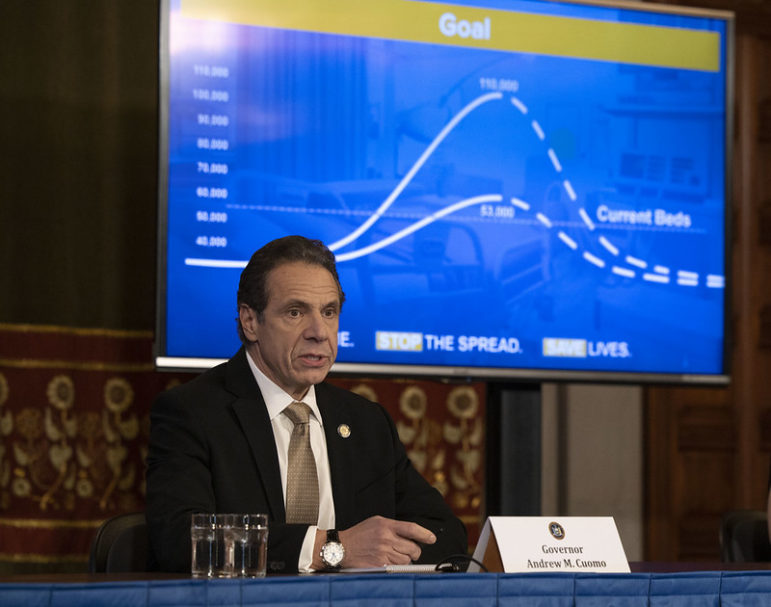
Mike Groll/Office of Governor Andrew M. Cuomo
Governor Andrew M. Cuomo provides a coronavirus update during a briefing in the Red Room at the state Capitol in Albany.On Rikers Island, there are over one thousand people incarcerated on parole violations, even as COVID-19 spreads rapidly through the jail population. Governor Cuomo could save their lives—or take them.
The Legal Aid Society’s Parole Revocation Defense Unit (“PRDU”) represents people trapped in New York’s parole violation system run by the Department of Corrections and Community Supervision (“DOCCS”). Our clients are some of the most vulnerable to COVID-19 and all are detained on administrative parole warrants. Until their cases resolve, usually after a series of adjourned hearings, they are incarcerated without bail.
These are society’s most vulnerable—and those most susceptible to COVID-19. Returning home from prison is a huge struggle. Ninety-five percent of our clients are people of color, many have mental-health diagnoses and substance abuse issues. They are trying to reclaim their humanity, reconnect with family and friends, and make sense of their lives in a world that has moved forward without them.
For most, getting back on their feet after decades in prison is a monumental task. Take James, for instance. He is in his 50s and is HIV positive. He failed to report to his parole officer (“PO”) for a few months and relapsed. James eventually entered and completed a drug rehabilitation program. James called his PO to tell her and she told him to report to the office. When he arrived, the PO cuffed him and brought him to Rikers Island.
Brian, who is 59 years old and has diabetes, is another example. Brian has been on parole supervision for over two years. He has a job with an organization that works to combat gun violence. Brian reported to the office, and, after testing positive for cocaine, was locked up and brought to Rikers.
George, who is in his late 40s and suffers from COPD and vascular disease, was charged with missing one office report and not being in his designated shelter. Parole officers arrested him at the shelter and put him in Rikers.
 CityViews are readers’ opinions, not those of City Limits. Add your voice today!
CityViews are readers’ opinions, not those of City Limits. Add your voice today!
Even our young clients are threatened. One of us struggled last week to reach a 22-year-old client who — fearing for his life — begged his attorney not to forget him. Until last week he was in solitary confinement, charged with a first-time parole violation. He’s reported abuse and neglect in custody, but what concerned his attorney most was his girlfriend’s report: fever. He’s now quarantined in a medical ward.
These individuals – and countless others – make up a large portion of the current population at Rikers. They are not accused of dangerous or violent behavior, nor are they charged with committing new crimes. They are incarcerated solely due to parole violations.
On March 16, because of the rapid spread of COVID-19, we requested that parole revocation hearings be held by telephone or video conference, and implored DOCCS to reduce the population of parolees in custody. Health experts—including the Riker’s Island chief physician—have warned that social distancing is impossible at Rikers.
DOCCs has failed to take action commensurate with the public health emergency we face. The agency’s inaction amounts to reckless indifference to our clients’ fate and is an act of violence jeopardizing not only the lives of prisoners, but those who work on Rikers, their families, and all of us who depend on New York City’s limited medical infrastructure.
The governor and Attorney general must lift all administrative warrants immediately.
On March 21, Cuomo said that if there’s any time to practice humanity, it is now. As New Yorkers take care of ourselves and our families during this trying time, we must not forget that New York’s fate is tied to the fate of detainees at Rikers. They cannot self-quarantine, or wash their hands because they have no soap, and they cannot care for a sick family member. They deserve our attention and compassion. The government must act now.
Laura Eraso, Kevin Lerman, Caitlin Miller, and Melanie Robinson are attorneys with the Parole Revocation Defense Unit at The Legal Aid Society.










2 thoughts on “Opinion: Cuomo Must Act to Save Jailed Parolees from COVID-19”
I was wondering when someone will think about these mostly young people. What are they to do where are they to go. They are a part of our society and we must take responsibility for them.
I’ve been on life parole since 1993 and I hope that someone files Civil Action against parole for it’s complete neglect of parolees.
NYS Div. of Parole releases from prison hundreds of people of color to parole supervision each year, most of which are paroled straight to NYC’s shelter system, without any meaningful support or help from parole/Doccs.
Then, once a parolees – who’s struggling to make a successful re-entry – once they stumble, parole is there to serve only one function; violate the parolee.
Parole has been allowed to escape any and all responsibilities to it’s parolees for way too long. Someone needs to file Civil Action against them for the gross neglect and/or indifference to it’s parolees, who’re mostly people of color.
I know this because I have personally suffered at parole’s hands for most of my adult life. I’m currently fighting to get off life parole so I can spend my remaining years with my 80 yr. Old mother who lives in South Carolina.
The time has come for parole to be held to account for the role it has long played in NYS’ prison complex industry.
Please sign me up whenever someone decides to bring this important matter to Federal Court.
Mr. Kevin Lerman of Legal Aid knows me well.
Sincerely,
Donell Dinkins
Aka
Jerry Reynolds
93-A-9588